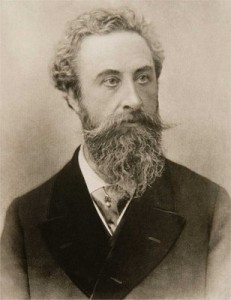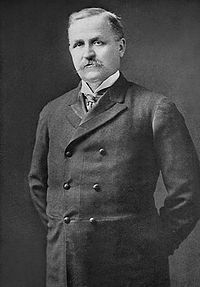William Scott-Elliott
Bulwer-Lytton, Sir Edward *
Sir Edward Bulwer-Lytton (1803–1873) was a British politician and  novelist. He coined a number of phrases that are still in use today; ‘the great unwashed’, ‘the pen is mightier than the sword’ and ‘pursuit of the almighty dollar’(f). The last is from his 1871 science fiction novel, Vril: The Power of the Coming Race[1336], which describes an underground race of superior beings with advanced powers.
novelist. He coined a number of phrases that are still in use today; ‘the great unwashed’, ‘the pen is mightier than the sword’ and ‘pursuit of the almighty dollar’(f). The last is from his 1871 science fiction novel, Vril: The Power of the Coming Race[1336], which describes an underground race of superior beings with advanced powers.
I have been reminded by Ronan Coghlan that the beef extract, Bovril, developed in the 1870s, had used ‘vril’ as part of its name to imply ‘bull-power’!
He was adopted by English Rosicrucians as their ‘Grand Patron’. The influence of Bulwer-Lytton extended to Helena Blavatsky who “compared Vril with the sidereal force of the Atlanteans, called Mash-Mak.” (e)
William Scott-Elliott took Bulwer-Lytton’s ideas seriously and has shown their influence in his references to Atlantis. In the early part of the 20th century, this fictional concept of vril was incorporated into esoteric Nazism, including the work of Brazilian right-winger, Gustavo Barosso.
Even today there is a so-called Church of Vrilology(b), which includes belief in a Black Sea location for Atlantis!(c)
On a lighter note, Bulwer-Lytton’s name has been given to a competition(d) that “challenges entrants to compose the opening sentence to the worst of all possible novels.” There have been many worthy winners.
(b) Church of Vrilology, Robert Blumetti, Balder Rising, Baldur, Odin, Wotan, Woden, Vril (archive.org)
(c) https://web.archive.org/web/20130108091223if_/http://www.vrilology.org/Atlantis_page.htm
(d) Home | The Bulwer Lytton Fiction Contest (bulwer-lytton.com)
(e) Fortean Times No.303 July 2013 p.43
(f) Edward Bulwer-Lytton – Wikipedia *
Scott-Elliot, William
William Scott–Elliot (18??-1930) was a merchant banker and part-time anthropologist. He was author of two works relating to Atlantis[543][544], both of which are available on the Internet(a). However, his work is mainly a re-working of some of Donnelly’s material, combined with a dash of Theosophy and a splash of racism, all of which was allegedly generated by ‘astral clairvoyance’ and by reference to ‘the Akashic Records’!
relating to Atlantis[543][544], both of which are available on the Internet(a). However, his work is mainly a re-working of some of Donnelly’s material, combined with a dash of Theosophy and a splash of racism, all of which was allegedly generated by ‘astral clairvoyance’ and by reference to ‘the Akashic Records’!
In his 1896 book, The Story of Atlantis, Scott-Elliot was one of the first to suggest that Atlanteans has flying machines or ‘air-boats’. This inclusion by him was influenced by the efforts of John W. Keely and Hiram Maxim to develop flying machines at the end of the 19th century. This silly suggestions of flying Atlanteans was revived later by Edgar Cayce with the even dafter idea that these aerial machines were made from the skins of elephants.
One of Scott-Elliot’s more entertaining revelations is that the Lemurians were 20 feet in height and had “huge feet, the heels of which stuck out so far they could as easily walk backwards as forwards.” One hopes that his banking was better than his writing.
Jacolliot, Louis
Louis Jacolliot (1837-1890) was a French barrister, a colonial judge (in southern India and Tahiti) and a writer. He was devoutly anticlerical and saw Christianity as a poor imitation of the more ancient oriental religions. He was the author of The Bible in India in which he traced the Hindu origins of Hebrew and Christian revelation.
He was  obsessed with Indian occultism and collected Sanskrit myths and interpreted some of them as telling of a sunken continent, Rutas, in the Indian Ocean. However, he decided to move this lost land to the Pacific and as a consequence, Jacolliot was quoted as an ‘authority’ by Blavatsky when she sought support for her own invention – Lemuria. Later this was embellished even further by William Scott Elliott. Jacolliot presented his sunken land as an echo of Plato’s Atlantis.
obsessed with Indian occultism and collected Sanskrit myths and interpreted some of them as telling of a sunken continent, Rutas, in the Indian Ocean. However, he decided to move this lost land to the Pacific and as a consequence, Jacolliot was quoted as an ‘authority’ by Blavatsky when she sought support for her own invention – Lemuria. Later this was embellished even further by William Scott Elliott. Jacolliot presented his sunken land as an echo of Plato’s Atlantis.
Joscelyn Godwin notes that Jacolliot is also credited with the invention of the story of Agartha[789.81].
At least two of Jacolliot’s books, Occult Science in India [1382]+ and The Bible in India [936]+, are now available online in English.
[936]+ https://archive.org/details/bibleinindiahind00jacorich *
[1382]+ http://www.sacred-texts.com/eso/osi/osi00.htm *
